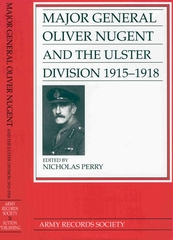Click here to view a text extract from this publication
 Major General (later Sir) Oliver Nugent commanded the Ulster Division on the western front between October 1915 and May 1918, leading it in most of its major battles including the Somme, Messines, Third Ypres, Cambrai and the German spring offensive of 1918. He left his mark indelibly on the Division as a tough, competent, no-nonsense commander, and under him it won its reputation as one of the best New Army formations. But there was also a strong political dimension to the Division, raised as it was from the pre-war Ulster Volunteer Force, and the tensions that arose between the professional standards he sought to impose and the political connections of many of his subordinates strained his relationships with both politicians at home and military superiors at the front.
Major General (later Sir) Oliver Nugent commanded the Ulster Division on the western front between October 1915 and May 1918, leading it in most of its major battles including the Somme, Messines, Third Ypres, Cambrai and the German spring offensive of 1918. He left his mark indelibly on the Division as a tough, competent, no-nonsense commander, and under him it won its reputation as one of the best New Army formations. But there was also a strong political dimension to the Division, raised as it was from the pre-war Ulster Volunteer Force, and the tensions that arose between the professional standards he sought to impose and the political connections of many of his subordinates strained his relationships with both politicians at home and military superiors at the front.The correspondence in this volume, drawn mainly from Nugentís papers in the Public Records Office of Northern Ireland, illustrates both the operational and political difficulties he faced. Nugent was a southern Irish Unionist commanding a strongly Ulster Unionist formation: issues such as selection of officers, recruitment, Divisional identity and cooperation with other Irish formations confronted him with problems that were as much political as military. But his correspondence also bring out vividly the pressures of commanding a division in some of the most intense actions of the war - the assault on the Schwaben Redoubt on 1st July 1916, the spectacular success at Messines, the murderous failure in the mud at Langemarck, the great tank attack at Cambrai, and the near destruction of the Division in March 1918. Centred particularly on Nugent's frank letters to his wife but also including exchanges with Sir Edward Carson, the King, and Generals Hutton, Macready and Maxse, as well as letters by Wilfrid Spender, a leading Unionist and member of his staff, this collection brings out the some of the complexity of Ireland's involvement in the Great War.